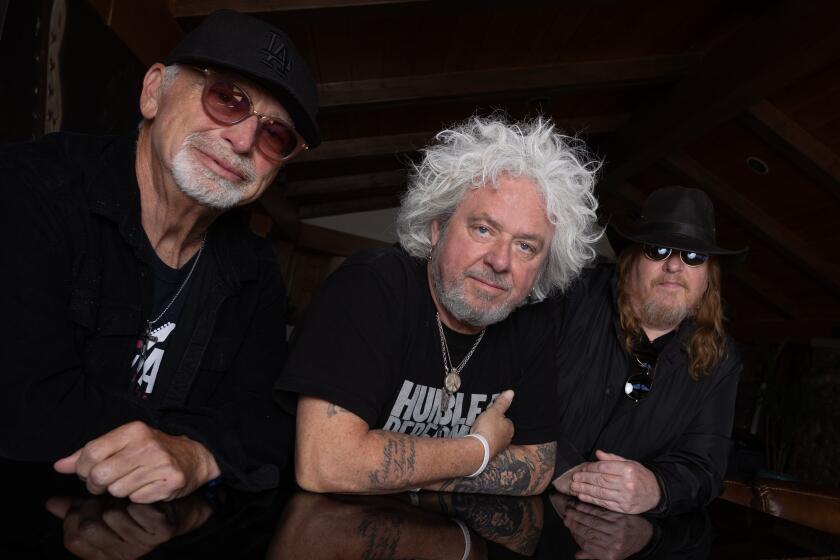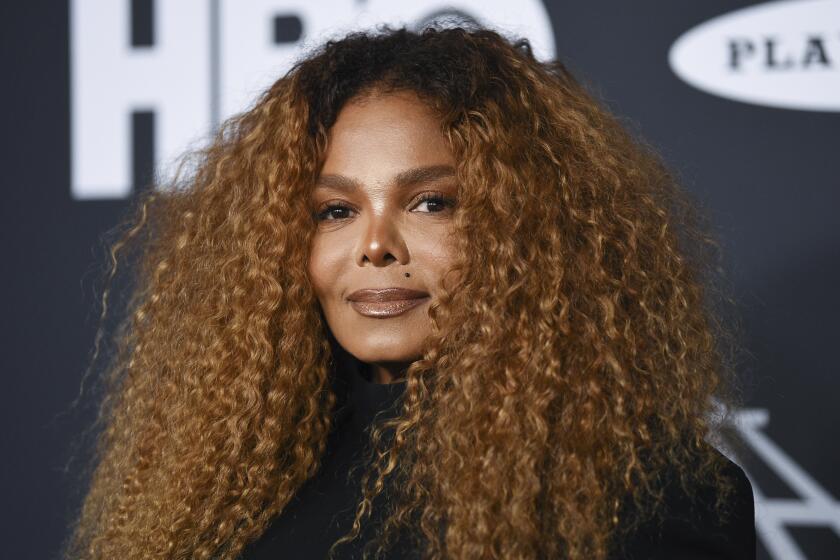On his own terms
It’s not every day that rappers are invited to hold court on “Larry King Live.” It’s also not every day that they decline the invitation. So before Chamillionaire told King last spring that he’d have to pass, the Grammy-winning rapper thought long and hard.
“I really wanted to do it. I want to be asked real questions about issues,” said Chamillionaire, who had been asked to appear on a show about the hullabaloo surrounding hip-hop, misogyny and the N-word. “But I decided it might not be smart because I know how it goes on these shows: I’d be arguing to a brick wall. You’re sitting up there as a scapegoat -- hip-hop is the new scapegoat.”
Instead, he continued, seated in a conference room at his publicist’s New York office and speaking with an intensity that borders on gravitas, “I decided that when I speak on these issues, it has to be in my own forum, and my forum is music.”
And so was born “Ultimate Victory,” Chamillionaire’s sophomore release (in stores today). He designed it to deliver “social commentary but still be entertaining -- I’m not trying to go over nobody’s head and preach to people.” And ironically the artist who deems himself not a rapper but a “self-employed CEO” -- in addition to his Universal-distributed label, Chamillitary Records, he owns a car customizing business and plans to launch a talent agency -- touts the new album as an artistic personal endeavor that’s profanity and N-word free, proving that hard-core hip-hop need not drown in offending terminology.
Case in point: the album’s first single, “Hip-Hop Police,” which features a jingle-like hook, a dramatic video, an alluring cameo from Slick Rick, the rapper known for his storytelling style -- and a weighty subject.
“It’s about how nowadays loving hip-hop is the equivalent of committing a murder,” Chamillionaire, 27, explained. The “hip-hop police” are not men in uniform, they’re moral watchdogs: “Al Sharpton could be a hip-hop police, or Bill O’Reilly.”
The Houston-born rapper finally cracked a smile. “Lately, I’m hearing people say, ‘Cham, you’ve been thinking too much.’ Thinking too much? That’s the dumbest thing I’ve ever heard.”
Those accusing Chamillionaire of excess thinking are probably those who know him less as an artist than as a ring tone. His blockbuster single “Ridin’,” from his platinum-plus 2005 album “The Sound of Revenge,” earned him a Grammy and the “Ridin’ ” ring tone went four-times platinum, signifying 4 million paid downloads. But on his new album, he says, deal-making has been trumped by creative pursuits.
“I was looking at the video channels and I’m seeing a rapper come on, talking about ‘being in the club,’ and ‘we’re in VIP,’ ” he reflected. “Then the next rapper comes on and he’s talking about, ‘We’re in the club and we’re in VIP.’ I was about to leave to go to the studio and I said, ‘Let me wait -- I hope the next video doesn’t say “club” and “VIP.” ’ But then the first line in the rap was ‘in the club, in VIP.’
“I’m like, ‘Why are we all doing the same thing and we don’t know it?’ I knew I had to find another lane.”
Featuring cameos from Lil’ Wayne, Devin the Dude and Lloyd, “Ultimate Victory” is meta-rap -- a barrage of commentary on hip-hop and pop culture -- that’s verbose enough to silence those who’d deem Southern hip-hop anti-lyrical. The track “Evening News” serves up Chamillionaire’s two cents on everything from Iraq to New Orleans -- “Every time I talk about Katrina / They look at me like it’s a misdemeanor,” he rhymes -- whereas “Morning News” is delivered from the perspective of a jaded TV viewer, glutted by trivial news reports.
At a time when album sales suffer and hip-hop sales plummet -- they’re down 33% since last year -- Chamillionaire paid out of pocket to record his album tracks, as well as for two Marc Klasfeld-directed videos and the album artwork, shot on location in Jamaica and France by Jonathan Mannion.
“The label was looking at me like, ‘What are you doing?’ ” he said. “But I didn’t think about calculating sales and getting my money back. Shoot, we waste money on all kinds of things anyway -- Rolls-Royces and stuff like that -- so I might as well waste it on art.”
It’s a luxury he says he earned. “I’m an underground mix-tape artist who’s had a level of commercial success,” he explained. “It opened the gateway to where I can get powerful enough to do what I want to do.”
Before earning that power, Chamillionaire was an underground Houston rapper, born Hakeem Sariki to a family of hip-hop police: His parents, Nigerian immigrants, banned rap from the home. He listened anyway, and in 2002 he and rapper Paul Wall, calling themselves the Color Changin’ Clique, sold more than 100,000 copies of their debut album, “Get Ya Mind Correct,” one of the year’s bestselling independent releases.
When the pair went their separate ways, Chamillionaire made his name as an independent artist whose “Mixtape Messiah” albums showcased a versatile style that was something of a cross between Nate Dogg and fellow Houston rapper Scarface: densely lyrical yet unfailingly melodic. In 2005, after a major-label bidding war, he landed Chamillitary Records at Universal and released his debut.
The chart success of “Ridin,’ ” he said, made some sense to him -- “Everyone could relate to that feeling of when, even if you’ve done nothing wrong and you see the police behind you, you get nervous” -- but the Weird Al Yankovic parody it inspired, “White and Nerdy,” took him by surprise:
“It was big -- he’s parodied Nirvana and Michael Jackson, and I’m not on that level,” he said. “I didn’t think anything bigger could happen.” It did: He won the 2006 Grammy for best rap performance.
Knowing he also had a ring tone hit on his hands, Chamillionaire negotiated with his label about a partnership deal. “Let’s just say I was hands-on,” he says, declining to offer details of the deal he ended up making directly with T-Mobile. When it comes to the music business, he is undaunted by precedents. “The mold of business changes every day,” he shrugged.
He may tout his new album as a triumph of art over commerce, but in fact Chamillionaire has made happy bedfellows of the two. To keep core audiences content -- “fans are spoiled nowadays,” he asserted -- he heralded the album release with the release of a free mix-tape and DVD, available for download on his website. But he also says he enjoys the creative freedom afforded by mix-tapes: “You can be free, wild with it -- there are no censors.”
After a cameo appearance on CW’s sitcom “The Game,” Chamillionaire is eager for quality acting roles because “the way [actors] get paid -- it’s straight cha-ching.” And though in the past he engaged in a high-profile feud with fellow Houstonites Paul Wall and Mike Jones, he’s elected to permanently eschew beef with other rappers because “it’s all about maturity -- I want to have a positive energy around me.”
Just then, the CEO in him rears its head.
“Besides, people beef for the sake of sales, but nobody’s selling,” he conceded. “Me, I’m trying to sell.”
More to Read
The biggest entertainment stories
Get our big stories about Hollywood, film, television, music, arts, culture and more right in your inbox as soon as they publish.
You may occasionally receive promotional content from the Los Angeles Times.










